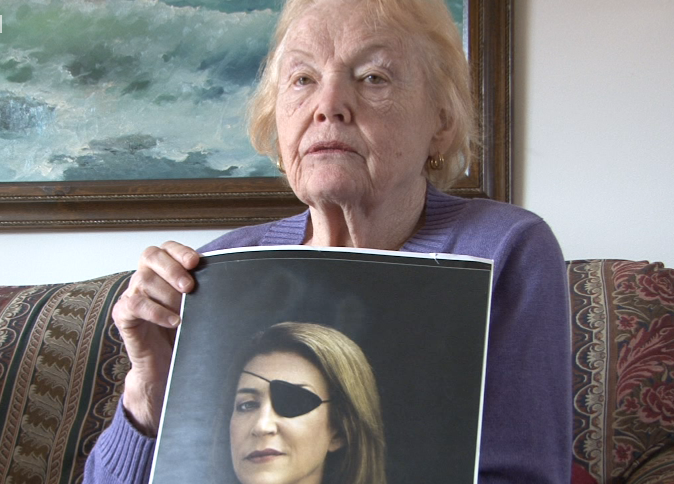

Rosemarie Colvin holds a picture of her daughter, Marie Colvin, who was killed in Syria reporting on crimes against humanity. (Photo: Rashed Mian/Long Island Press
Shelling in the Syrian city of Homs killed 20 people Wednesday including war correspondent Marie Colvin, a Long Island-native who reported from the front lines of war-torn areas in the Middle East and Africa for more than two decades, but always managed to make it home to London safely. She was 56.
A French photojournalist, Remi Ochlik, was also killed and two other journalists were injured in the attacks.
The news of Colvin’s death came just hours after she appeared on CNN reporting about the bloodshed in Syria, which aired multiple times Tuesday night and finally caught the attention of her brother William just after 1 a.m. Wednesday.
“She could’ve already been dead,” he said nine hours after watching his sister on television, as he stood outside the family’s home in East Norwich. “Her not getting out of it is more of a shock to me because she’s always been able to get away and come back home.”
According to reports, the makeshift press center where Colvin, on assignment for the Sunday Times of London, and Ochlik, were working was destroyed in the attack. That fueled speculation that the journalists were targeted by Syiran President Bashar Assad’s regime in an effort to squash reports that the government is killing civilians during anti-government uprisings.
“There’s been constant shelling in the city,” she told Anderson Cooper on AC 360 Tuesday night, as she detailed the death of a little boy in Homs.
Back on Long Island, Colvin’s family and friends gathered at her mother’s East Norwich home, saying the brave journalist turned down offers to be an editor several times because she wanted to “bare witness and tell the truth,” her brother, William said.
“That’s why she went to Syria,” he said. “That’s why she was in Libya.”

This is an undated image made available Wednesday Feb. 22, 2012 by the Sunday Times in London of Sunday Times journalist Marie Colvin photographed in Tahrir square in Cairo. The French government spokeswoman on Wednesday identified two Western reporters killed in Syria as American war reporter Marie Colvin and French photojournalist Remi Ochlik .(AP Photo/Ivor Prickett Sunday Times)
Inside the house, professional pictures of Colvin were spread out on the small coffee table as her mother Rosemarie, a retired Oyster Bay school teacher, reflected on her daughter’s life and her determination to tell the truth.
Rosemarie said she learned of her daughter’s death when Colvin’s editor called early Wednesday morning.
She was unaware of her daughter’s travels and the editor told her that Colvin was supposed to leave Syria on Wednesday because it became too dangerous for her to remain there.
“She wanted to finish [the story] and that she would leave today,” she remembered the editor saying, her eyes tearing up. “And that’s really hard because it’s just one day.”
“She was murdered,” Rosemarie said, her voice rising, after she was asked if she thought the rockets were intended for the journalists in Syria. “I don’t believe you just find a house…she was murdered…whatever it is, she was murdered.”
Colvin was born and raised on Long Island and graduated from Oyster Bay High School in 1974. She was the oldest of five children and was the “boss” of the family, her mother said.
She had a taste for adventure at a very young age and also involved in several protests, including the March on Washington in 1963.
She found her love for journalism when she attended Yale University, Rosemarie said, working for several newspapers including the United Press International, before becoming a war correspondent for the Sunday Times, where she worked for the last two decades.
She had several brushes with danger, getting lost in the snowy mountains of Chechyna, facing detainment in Libya for several hours and injuring her eye in Sri Lanka in 1991, forcing her to wear an eye patch for the last 20 years.
The veteran war correspondent also appeared in an A&E documentary called “Bearing Witness” which told the story of five female journalists, including Colvin, who found themselves in the line of fire during the war in Iraq.
Colvin’s family said the reporter wasn’t in contact with them in recent weeks and it was unclear how she even entered Syria, which has prohibited journalists from entering the country.

This is an undated image made available Wednesday Feb. 22, 2012 by the Sunday Times in London of journalist Marie Colvin. (AP Photo/Sunday Times)
“I entered Homs on a smugglers’ route, which I promised not to reveal, climbing over walls in the dark and slipping into muddy trenches,” she wrote in a recent report in the Sunday Times. “Arriving in the darkened city in the early hours, I was met by a welcoming party keen for foreign journalists to reveal the city’s plight to the world. So desperate were they that they bundled me into an open truck and drove at speed with the headlights on, everyone standing in the back shouting “Allahu akbar” — God is the greatest. Inevitably, the Syrian army opened fire.
“When everyone had calmed down I was driven in a small car, its lights off, along dark empty streets, the danger palpable. As we passed an open stretch of road, a Syrian army unit fired on the car again with machineguns and launched a rocket-propelled grenade. We sped into a row of abandoned buildings for cover.”
Perhaps the most difficult aspect of her daughter’s death is not knowing if the family will ever get Colvin’s body back from Syria, Rosemarie said.
“I’m proud of her,” she said, “but I’m going to miss her.”
“The scale of human tragedy in the city is immense,” Colvin wrote in the Sunday Times article about Syria. “The inhabitants are living in terror. Almost every family seems to have suffered the death or injury of a loved one.”






